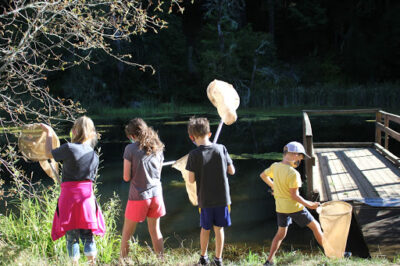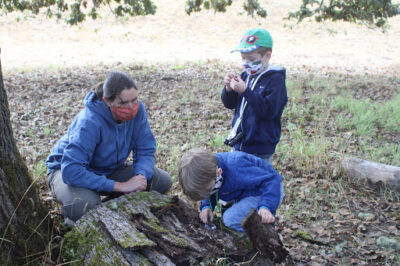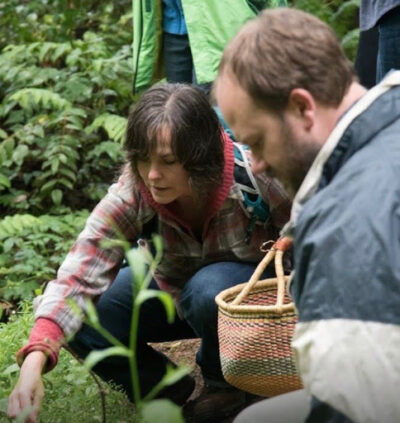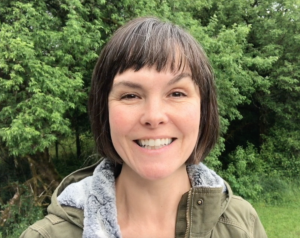Guest Blog Post by Neyssa Hays, Program Director, Outdoor Education Adventures
 I grew up in a way that doesn’t exist for most kids anymore. I spent much of my childhood outside and unattended, climbing trees, catching frogs and salamanders in waist-high mud, and building secret hide-aways of sticks and moss. Sometimes my siblings were with me, but often it was just me and the natural world. My family was quite poor financially, but our experiences gave us a rich life beyond measure.
I grew up in a way that doesn’t exist for most kids anymore. I spent much of my childhood outside and unattended, climbing trees, catching frogs and salamanders in waist-high mud, and building secret hide-aways of sticks and moss. Sometimes my siblings were with me, but often it was just me and the natural world. My family was quite poor financially, but our experiences gave us a rich life beyond measure.
Since the 1980’s, kids have grown and are growing up in a more structured and controlled world than previous generations. Long gone are the days when parents would send their children outside to play with friends from dawn until dusk. Though study after study shows that children need unstructured time to play outside, most parents are concerned about the potential dangers of allowing their children to simply wander with their friends. This has led to children spending most of their time indoors, often on screens, a trend that led author and naturalist Richard Louv to coin the term “Nature Deficit Disorder.”
 Since Louv’s 2005 release of “Last Child In the Woods,” there has been an explosion of scientific research into the benefits of spending time outside, both for kids and adults. The results of the research are clear: time spent outdoors (especially in natural settings) has great benefits for our physical, emotional, and mental health. The earlier and more frequent those experiences occur, the greater the benefits over a lifetime.
Since Louv’s 2005 release of “Last Child In the Woods,” there has been an explosion of scientific research into the benefits of spending time outside, both for kids and adults. The results of the research are clear: time spent outdoors (especially in natural settings) has great benefits for our physical, emotional, and mental health. The earlier and more frequent those experiences occur, the greater the benefits over a lifetime.
According to research, unstructured outdoor play improves children’s academic and social skills, as well as their health and wellness. The Children & Nature Network, whose mission is “to increase equitable access to nature so that children–and the natural world–can thrive,” states that time spent in nature:
- Enhances creativity, critical thinking, and problem-solving.
- Boosts reading, writing, math, social studies, and science performance.
- Increases focus and attention while reducing symptoms of attention deficit hyperactivity disorder (ADHD).
- Increases enthusiasm for and engagement with learning.
- Improves relationship skills and impulse control.
- Reduces anger, stress, and disruptive behavior.
- Reduces nearsightedness.
- Increases physical activity, which reduces the risk of obesity.
 I have seen many of these benefits myself, both with my own children and other children I know. But if parents can’t do it, and classroom teachers are stuck “teaching to the test,” who will encourage children to play in and teach children about nature? The answer is nature-based learning organizations, like Outdoor Education Adventures, a non-profit, outdoor science education program developed in and serving Yamhill County.
I have seen many of these benefits myself, both with my own children and other children I know. But if parents can’t do it, and classroom teachers are stuck “teaching to the test,” who will encourage children to play in and teach children about nature? The answer is nature-based learning organizations, like Outdoor Education Adventures, a non-profit, outdoor science education program developed in and serving Yamhill County.
Outdoor Education Adventures’ mission is to provide equitable opportunities for positive educational experiences in nature. Through nature immersion, exploration, and discovery we increase scientific literacy, knowledge of our local natural history and ecology, and inspire ecological stewardship in our communities.
With a passion for the outdoors, Outdoor Education Adventures (OEA) offers outdoor science day camp experiences and after-school programs for ages 5-10, basic survival skills programs for ages 11-13, and volunteer leadership opportunities for teens and young adults. We also offer guided hikes for families or groups of friends who want to expand their knowledge of the local environment in a fun, relaxed way. Additionally, we are happy to plan custom outdoor science programs for field trips, community programs, and homeschool groups.
OEA’s staff have together been offering outdoor science programs to Yamhill County residents of all ages since 2015. Our Program Directors and Lead Educators, Theresa Crain and Neyssa Hays, each have extensive experience teaching in both formal and informal settings and nature interpretation, as well as experience in natural resource management.
Supported by a dedicated group of volunteer board members, OEA has set goals to expand our program offerings and get more members of our community outdoors learning and experiencing nature. We are looking for creative ways to raise funds that will allow us to offer tuition assistance to more of our program participants and hire staff to help us deliver more programs. OEA is insured, and is registered with the State of Oregon as a recorded program. Our staff and volunteers are vetted through the Office of Child Care’s Central Background Registry.
Registration is open now for our spring and summer programs. Please visit our website at OutdoorEdAdventures.com to learn more about us, sign up for our email list (to receive early program updates, special offers, and announcements), or make a tax-deductible donation. Financial assistance is available on an honor-based, sliding scale system; see our website for more information. While you’re there, please hit the “contact us” link and drop us a line; we’d like to hear from you. You can also find us on Facebook, Instagram, and YouTube.

ABOUT THE AUTHOR— Neyssa Hays
Neyssa holds a degree in Fisheries and Wildlife Sciences from Oregon State University and a degree in Russian from Portland State University. She has worked in the natural resources field since 2004 as a park ranger, naturalist, and fisheries biologist assistant as well as an educator for the Oregon Zoo and Portland Public Schools. Contact: neyssa@outdooredadventures.com


